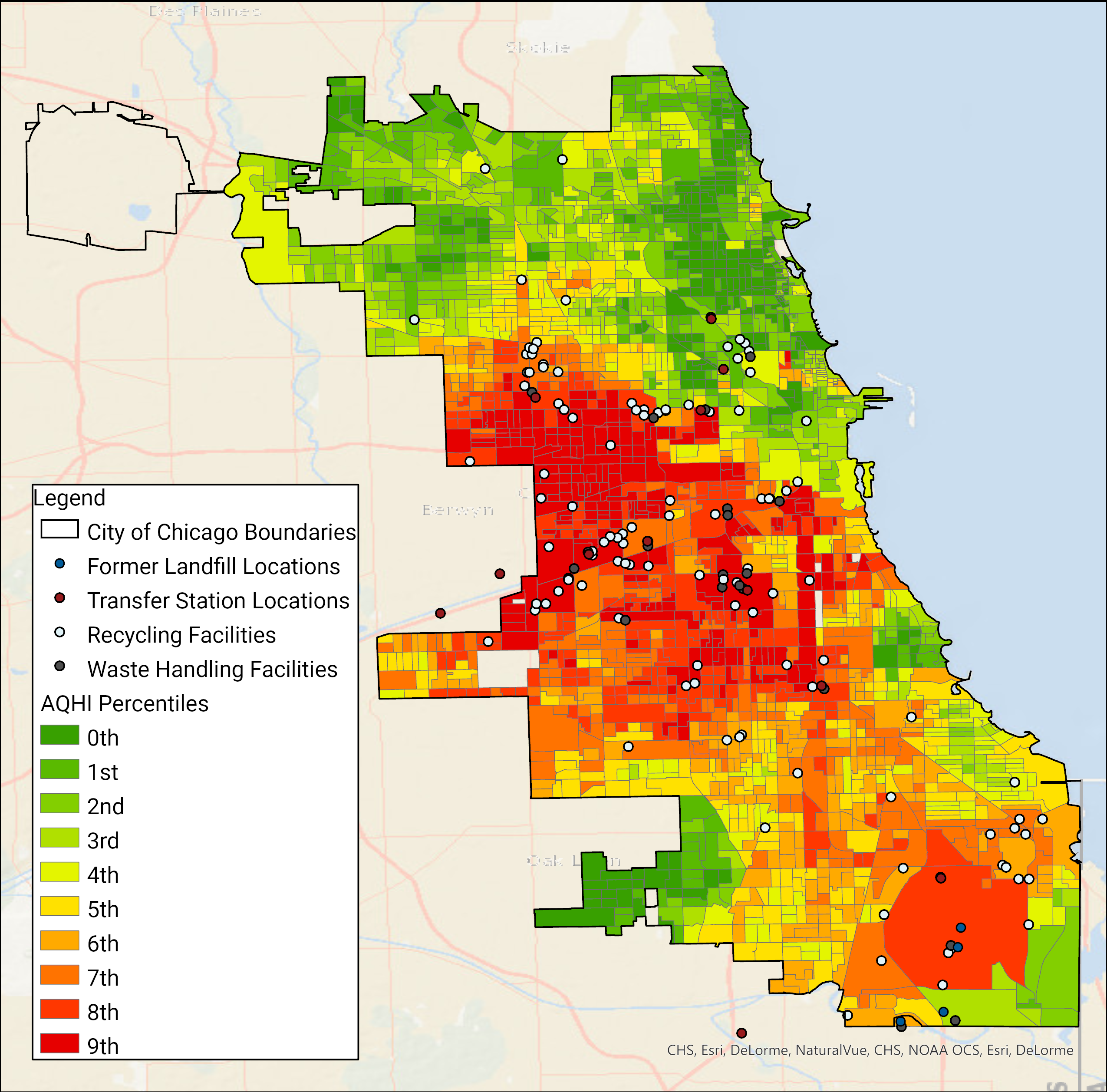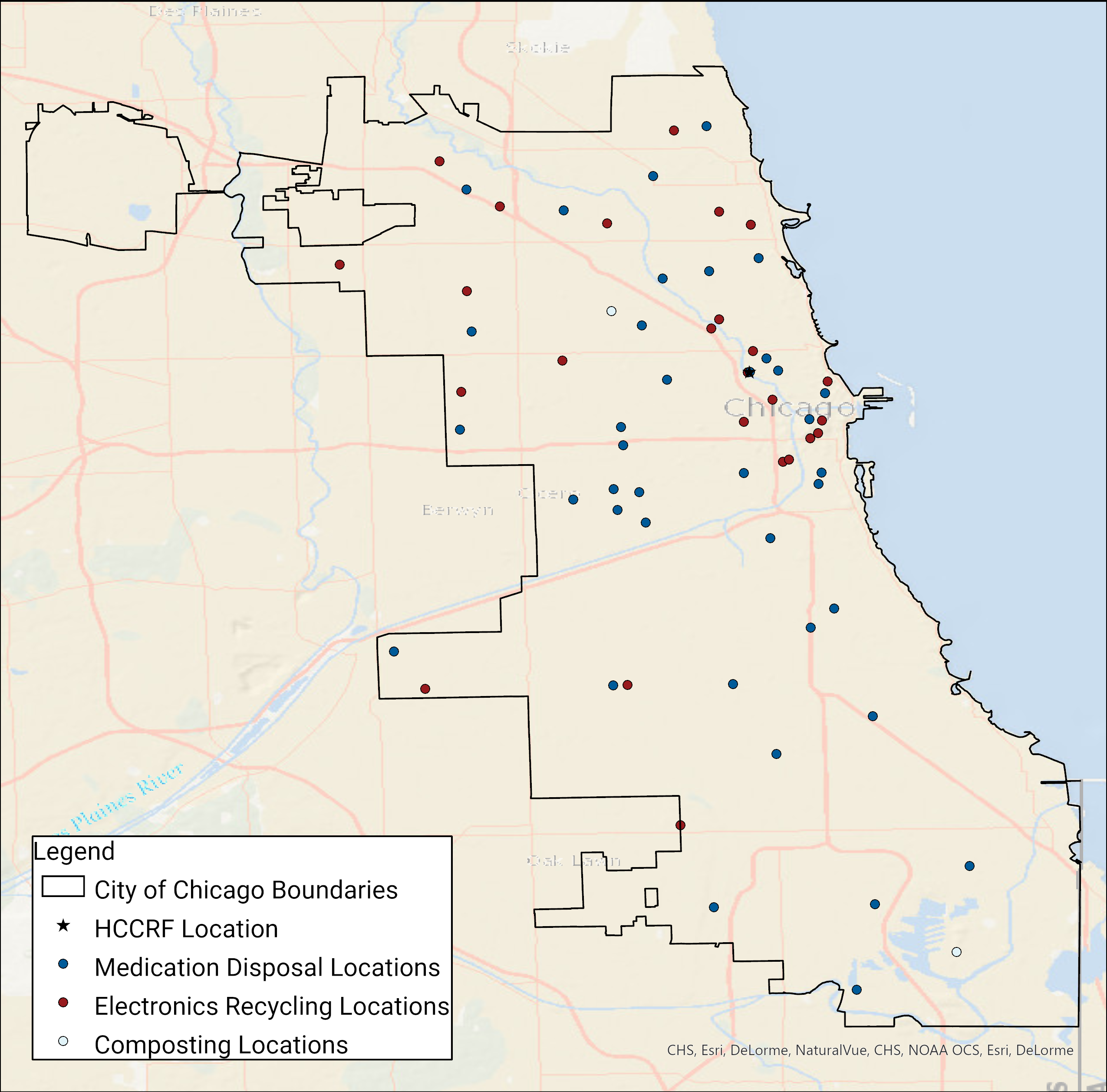
The City of Chicago has the opportunity to implement strategies to tackle waste and materials management that impact our economy, environment, and citizens every day. These strategies offer opportunities to reduce waste; increase diversion through reuse, recycling, and composting; reduce costs; and increase economic and environmental justice opportunities.
Delta Institute was hired by the City of Chicago Office of the Mayor to conduct a comprehensive assessment of the entire municipal waste system and its directly related impacts on the community. As a core part of our efforts, Delta Institute developed a holistic, pragmatic roadmap with short- and long-term recommendations to re-envision what materials management in Chicago could look like, while ultimately turning waste into resource.
Brief Overview of What We’re Doing
Delta has worked with a diverse roster of stakeholders, including City of Chicago municipal departments, fellow nonprofits, universities, community groups, and individuals. We are grateful to them for their insights, keen understanding, and feedback. Strategies were developed through: Review of current waste and recycling data, programs, policies, and infrastructure; Analysis of best practices and programs in peer cities; and, Engagement with stakeholders in the City, the private sector, and Chicago communities.
Effectively managing materials and waste requires a highly efficient system of interconnected infrastructure and personnel across the public and private sectors. There is an opportunity to improve this system using innovative technology, research, and design, but ultimately this challenge requires a coordinated effort by the City of Chicago, commercial and industrial businesses, institutions, and citizens. Delta Institute has partnered with the City of Chicago to identify and analyze existing data, policies, stakeholders, and impacts of Chicago’s waste, recycling, composting, and reuse systems to develop strategies for improvement.
The goal of the City of Chicago Waste Strategy is to identify concrete actions to:
-
- Decrease waste disposal and associated negative environmental impacts;
- Reduce costs and increase efficiency;
- Maximize economic investment and workforce development opportunities; and,
- Address social and environmental justice inequities.
Redesigning how the City manages materials and addressing long-standing environmental justice inequities requires a long-term commitment by many Chicago stakeholders. This holistic strategy represents the first step in that process. This first phase of work provides guidance that accounts for the many perspectives of Chicago’s waste and civic stakeholders, addresses budgetary realities, and incorporates other systemic factors to comprehensively prioritize actionable strategies. Please read the City of Chicago’s press release.
Our Work in Action; Post-Project Update
In 2021 Delta successfully concluded our contracted scope with the City of Chicago to address the City’s solid waste management implementation stemming from our successful Waste Strategy. We continue engaging with the City’s Department of Streets and Sanitation (DSS), as well as with paste/present Mayoral Administrations, on follow-ups and implementation of the Waste Strategy. Efforts are underway, and align with City sustainability priorities. Key updates include:
- Chicago’s first-ever citywide composting program: In October 2023, the City of Chicago announced that for the first time, residents can bring food waste to one of 15 locations across the city and dispose of it in a green bin. This inaugural program stems from the City of Chicago Waste Strategy highlighted on this page; our report urged expanding ways for residents and food industry businesses to compost organic waste instead of the trash. In 2022 post the report’s release, DSS has partnered with NeighborSpace on six small-scale community garden compost sites located throughout Chicago; these pilot locations were on NeighborSpace-protected community garden sites and accepted certain organic waste materials from area residents–these efforts then lead to the citywide composting roll-out. Please learn more about DSS’s composting efforts.
- Dept of Streets and Sanitation Infrastructure: DSS realigned their budget in 2022-onward to include additional outreach, consumer education, and coordination of Citywide recycling, composting, and waste management efforts. These budget efforts resulted in new staff, new equipment, and expanded data management systems–all of which are being used to plan future education and outreach campaign(s). DSS is working to decrease waste disposal and associated negative environmental impacts; reduce costs and increase efficiency; maximize economic investment and workforce development opportunities; and address social and environmental justice inequities. Please learn more about DSS’s waste and recycling management efforts.
- Waste Vendor Management: DSS has reviewed and updated contracts with City vendors, resulting in fewer recycling cart rejections due to contamination–meaning that more recyclable materials are being recycled in the City.
- Ongoing and Future Waste Implementation Strategy: The City is actively monitoring waste management and reduction strategies to inform the next interation of the 2021 Waste Strategy.
The above are directly aligned with the Waste Strategy’s roadmap for successful completion of 12 out of 63 waste reduction strategies, namely city-wide compositing and consumer education opportunities.
Please watch our Waste Strategy webinar
We want to keep the conversation going, so that plans turn into actions as the City of Chicago improves the way we think about, and manage, materials.
Please watch the webinar recording on Delta Institute’s YouTube channel or download the presentation slides from our July announcement. You’ll hear from representatives from the Office of the Mayor, the Department of Streets and Sanitation, Delta Institute, and the University of Illinois at Chicago. Original airing occurred on July 15, 2021.
The complete City of Chicago Waste Strategy is comprised of:
-
- Executive Summary: An overview of the full strategy, emphasizing key take-aways, recommendations, and a brief snapshot of each component of the complete Waste Strategy.
- Existing Conditions Report: The Existing Conditions Report sets the stage for current and historical waste and recycling programs and services, plans and policies, stakeholders, and related climate, economic, and equity impacts and challenges for the City of Chicago.
- Waste Characterization and Generation Update Report: The University of Illinois at Chicago (UIC) supported the Chicago Waste Strategy by conducting data analysis and modeling to project waste generation and characterization for Chicago in 2020. In lieu of a full-scale waste audit, the UIC team provided waste and recycling estimates based on Chicago historical data, along with regional and national datasets. Material-specific trends, innovations, and consumer expenditures were identified and summarized as well.
- Peer City Analysis: The Peer City Analysis Report describes various solid waste management programs, practices, and policies utilized in metropolitan areas across the United States, including New York City; Houston; San Jose; Portland; St. Louis (inclusive of a deconstruction pilot that Delta Institute authored a related deconstruction market assessment); and more local peers such as Evanston, IL; Michigan City, IN; Lansing, MI; and Madison, WI.
- Materials Management Strategies: Delta Institute identified 63 strategies to address waste and materials management, with 12 identified as achievable in the short-term (2021-2022; please see below). Implementation opportunities are spotlighted across seven categories, from municipal management and policy to the many waste streams that flow through the city. In each of those categories, several potential options for the City are presented to allow for short-term implementation, as well as long-term budgeting, planning, and partnership building. Strategies across all categories are guided by a set of established principles intended to capture City and stakeholder priorities.
Guiding Principles
All our efforts were guided by the below principles:
- Reframe Chicago’s materials as resources, instead of waste;
- Center equity and environmental justice in program design;
- As the City, identify opportunities for establishing internal and external partnerships;
- Prioritize initiatives with revenue potential, no/low cost, or a positive return on investment when applied at scale;
- Identify opportunities to include goal setting, metrics, and data sharing to demonstrate progress and increase transparency; and
- Equip consumers with the education and tools needed to drive innovation in evolving waste systems.
SHORT-TERM PRIORITIES AND RECOMMENDATIONS
Policy Review and Exploration
- Researching potential for implementing waste hauling zones for commercial waste.
- Support ambitious statewide extended producer responsibility (EPR) legislation.
- Assessing Construction & Demolition Debris (C&D) Recycling Ordinance compliance and identifying opportunities for increased contractor education.
- Adjusting the C&D Recycling Ordinance to specify targeted material types and parameters for reuse.
Increasing Opportunities for Community Interventions
- Leverage the National Resources Defense Council (NRDC) Food Matters Great Lakes Regional Cohort participation to pilot food waste prevention and recycling programs.
- Maintaining clear and consistent messaging around recycling contamination.
- Introducing organics drop off locations through seasonal “pumpkin smash” events.
- Developing a directory of participating retail take-back options for e-waste and HHW in Chicago.
- Establishing a revenue-sharing partnership with a textile recycling company for collection of clothes, shoes, and other textiles otherwise ending up in landfills.
Strengthening Internal Operations
- Identifying appropriate Blue Cart to black cart distribution and bin size options.
- Improving high-density residential recycling ordinance compliance based on 2020 Chicago Office of the Inspector General report findings.
- Improving Chicago’s existing yard waste collection program and incorporating potential food scrap “ride along” options.


Partners
Delta Institute is deeply appreciative to the Office of the Mayor for selecting us to prepare these important strategic recommendations. We would like to thank the University of Illinois at Chicago and Dr. Ning Ai for preparing the Waste Characterization and Generation Update report. Delta Institute would like to give warm appreciation to the more than 90 stakeholders composed of elected officials, City departments, private and nonprofit organizations, and individuals in developing these resources for the City of Chicago. We look forward to putting conversation and learnings into action, so that Chicago is a healthier and more sustainable City for everyone.
Funding
Delta Institute was engaged by the Office of the Mayor at the City of Chicago to prepare the City of Chicago Waste Strategy and resulting recommendations.

